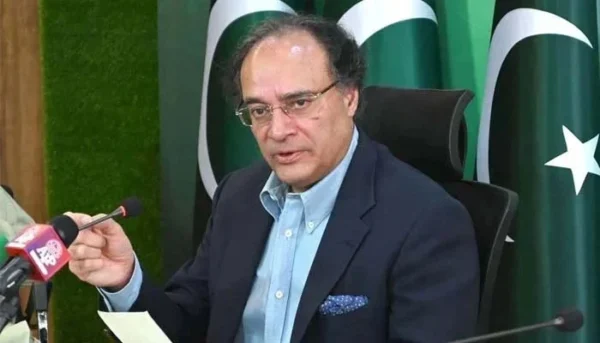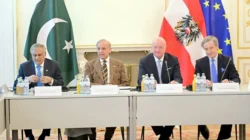Pakistan committed to pursuing sustainable, inclusive, climate-resilient economic growth: Aurangzeb

Publishing date: 07 November 2025
Federal Minister for Finance and Revenue Senator Muhammad Aurangzeb on Thursday reaffirmed that Pakistan’s approach to virtual assets and blockchain technology will remain firmly aligned with the country’s specific risk profile and regulatory priorities, including safeguards against capital flight, money laundering, and investor suitability.
The minister emphasised the need for pragmatic, coordinated, and forward-looking approaches to climate finance and sustainable development while speaking at the 28th Sustainable Development Conference (SDC) organised by the Sustainable Development Policy Institute (SDPI) in Islamabad. The minister addressed a special session titled “Mobilizing Finance for Circular South Asia: Blended Finance, Regional Funds and Private Capital”, held in collaboration with UNESCAP, IGES, and other regional partners, which brought together policymakers, economists, and development experts from across South Asia.
Welcoming the local and international delegates, Senator Aurangzeb noted that despite global uncertainty, the world economy continues to show remarkable resilience, driven by structural reforms, private sector dynamism, and restrained protectionist policies. He underlined that countries like Pakistan must continue to build strong fiscal and external buffers to manage potential external shocks amid rising protectionism and supply chain realignments. Touching briefly on Pakistan’s emerging digital finance landscape, the minister referred to the creation of the Pakistan Crypto Council and the establishment of the Virtual Asset Regulatory Authority, which is being legislated through Parliament.
Turning to the core theme of climate finance, Senator Aurangzeb highlighted Pakistan’s comprehensive framework that includes the National Adaptation Plan, Nationally Determined Contributions (NDCs), the Climate Prosperity Plan with the V-20, the Green Taxonomy issued by the State Bank, and the National Climate Finance Strategy rolled out in Baku last year. He noted that while the global financing gap remains large, Pakistan already has sufficient resources and frameworks to begin effective implementation.
The minister informed that Pakistan has secured significant multilateral support, including $1.3 billion from the IMF under the Resilience and Sustainability Facility (RSF), $500 million from the Asian Development Bank, and a 10-year Country Partnership Framework with the World Bank Group worth $2 billion annually, focused primarily on climate change and population—two existential challenges for Pakistan. Senator Aurangzeb called for realism regarding global climate finance mechanisms, noting that funds such as the Green Climate Fund and Loss and Damage Fund remain limited and bureaucratic.
He stressed that Pakistan must focus on mobilizing its own resources, private capital, and market-based mechanisms such as green bonds and carbon markets. The minister also appreciated innovative private sector initiatives such as Acumen’s $90 million Climate Action Fund and Sindh’s pioneering mangrove carbon credit project, urging that these be replicated and scaled up nationwide. He highlighted the growing potential for debt-for-nature swaps and called for enhanced technical capacity to design, structure, and monitor bankable, investable climate projects meeting international standards.
Senator Aurangzeb underscored the vital role of finance ministries in mainstreaming climate action, observing that if climate priorities are not integrated into national budgets, they cannot become national policy. He reaffirmed the government’s resolve to prioritize climate change and population management within Pakistan’s economic and fiscal planning.
Concluding his remarks, the minister urged collective ownership and coordination across all stakeholders, emphasizing that Pakistan must make the most of existing opportunities and resources before seeking new policy instruments. “We must take ownership, coordinate better, and move forward with urgency to address these existential issues,” he stated. He thanked SDPI and its international partners for hosting the regional dialogue and reaffirmed the government’s commitment to pursuing sustainable, inclusive, and climate-resilient economic growth. Meanwhile, Pakistan Pharmaceutical Manufacturers’ Association (PPMA) on Thursday discussed the establishment of PharmEx Pakistan, a dedicated pharmaceutical export platform to plan and execute strategies for achieving $3 billion in pharmaceutical exports within the next three years and $10 billion over the subsequent five years, with the finance minister.
A high-level delegation of the PPMA, under the leadership of its newly elected Chairman Dr Tahir Azam, along with Vice Chairman Athar Nazir Sheikh, former chairmen Mian Asad Shuja and Mian Khalid Misbah, and Executive Committee members Aman Sheikh and Usman Shaukat, called on Muhammad Aurangzeb and his team at the Finance Division. The meeting focused on the industry’s export performance, the government’s reform initiatives, and the future roadmap for making Pakistan a major player in the global pharmaceutical market. The PPMA delegation informed that pharmaceutical exports have registered a record 34 percent year-on-year increase, the highest on record.
The PPMA underscored the critical importance of establishing PharmEx Pakistan as a joint representative body of the Ministries of Health, Commerce, and Finance, along with TDAP and DRAP, led by the private sector. The proposed entity will serve as a one-window platform to promote and expand pharmaceutical exports through trade facilitation, market diversification, global certification support, and international collaboration. Finance minister commended the industry’s outstanding performance, noting that while global pharmaceutical growth is averaging around 5 percent, Pakistan’s domestic growth stands at 18 percent, supported by an exceptional 34 percent export growth rate. “Your performance in such globally-competitive environment is extraordinary,” he remarked, adding that as macroeconomic conditions continue to stabilize, the industry’s prospects will further improve.
The minister reaffirmed the government’s full support for the pharmaceutical sector’s expansion plans and appreciated the proactive engagement of the PPMA in driving export growth and improving competitiveness. He stressed that the government’s broader economic strategy focuses on boosting exports, attracting investment, and deepening public-private partnerships – areas where the pharmaceutical industry is playing a leading role. Senator Aurangzeb assured that the Ministry of Finance will continue to facilitate the sector in collaboration with other relevant ministries and institutions to address fiscal and regulatory challenges and enable sustainable export-led growth. The meeting concluded with a shared understanding to continue close coordination between the government and the pharmaceutical industry to advance Pakistan’s export competitiveness and realize its ambitious growth targets under the proposed PharmEx Pakistan initiative.





